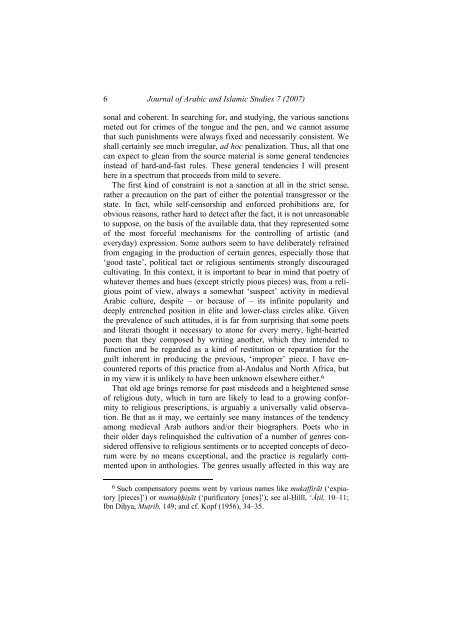Freedom of Expression and Censorship in Medieval Arabic Literature
Freedom of Expression and Censorship in Medieval Arabic Literature
Freedom of Expression and Censorship in Medieval Arabic Literature
You also want an ePaper? Increase the reach of your titles
YUMPU automatically turns print PDFs into web optimized ePapers that Google loves.
6<br />
Journal <strong>of</strong> <strong>Arabic</strong> <strong>and</strong> Islamic Studies 7 (2007)<br />
sonal <strong>and</strong> coherent. In search<strong>in</strong>g for, <strong>and</strong> study<strong>in</strong>g, the various sanctions<br />
meted out for crimes <strong>of</strong> the tongue <strong>and</strong> the pen, <strong>and</strong> we cannot assume<br />
that such punishments were always fixed <strong>and</strong> necessarily consistent. We<br />
shall certa<strong>in</strong>ly see much irregular, ad hoc penalization. Thus, all that one<br />
can expect to glean from the source material is some general tendencies<br />
<strong>in</strong>stead <strong>of</strong> hard-<strong>and</strong>-fast rules. These general tendencies I will present<br />
here <strong>in</strong> a spectrum that proceeds from mild to severe.<br />
The first k<strong>in</strong>d <strong>of</strong> constra<strong>in</strong>t is not a sanction at all <strong>in</strong> the strict sense,<br />
rather a precaution on the part <strong>of</strong> either the potential transgressor or the<br />
state. In fact, while self-censorship <strong>and</strong> enforced prohibitions are, for<br />
obvious reasons, rather hard to detect after the fact, it is not unreasonable<br />
to suppose, on the basis <strong>of</strong> the available data, that they represented some<br />
<strong>of</strong> the most forceful mechanisms for the controll<strong>in</strong>g <strong>of</strong> artistic (<strong>and</strong><br />
everyday) expression. Some authors seem to have deliberately refra<strong>in</strong>ed<br />
from engag<strong>in</strong>g <strong>in</strong> the production <strong>of</strong> certa<strong>in</strong> genres, especially those that<br />
‘good taste’, political tact or religious sentiments strongly discouraged<br />
cultivat<strong>in</strong>g. In this context, it is important to bear <strong>in</strong> m<strong>in</strong>d that poetry <strong>of</strong><br />
whatever themes <strong>and</strong> hues (except strictly pious pieces) was, from a religious<br />
po<strong>in</strong>t <strong>of</strong> view, always a somewhat ‘suspect’ activity <strong>in</strong> medieval<br />
<strong>Arabic</strong> culture, despite – or because <strong>of</strong> – its <strong>in</strong>f<strong>in</strong>ite popularity <strong>and</strong><br />
deeply entrenched position <strong>in</strong> élite <strong>and</strong> lower-class circles alike. Given<br />
the prevalence <strong>of</strong> such attitudes, it is far from surpris<strong>in</strong>g that some poets<br />
<strong>and</strong> literati thought it necessary to atone for every merry, light-hearted<br />
poem that they composed by writ<strong>in</strong>g another, which they <strong>in</strong>tended to<br />
function <strong>and</strong> be regarded as a k<strong>in</strong>d <strong>of</strong> restitution or reparation for the<br />
guilt <strong>in</strong>herent <strong>in</strong> produc<strong>in</strong>g the previous, ‘improper’ piece. I have encountered<br />
reports <strong>of</strong> this practice from al-Andalus <strong>and</strong> North Africa, but<br />
<strong>in</strong> my view it is unlikely to have been unknown elsewhere either. 6<br />
That old age br<strong>in</strong>gs remorse for past misdeeds <strong>and</strong> a heightened sense<br />
<strong>of</strong> religious duty, which <strong>in</strong> turn are likely to lead to a grow<strong>in</strong>g conformity<br />
to religious prescriptions, is arguably a universally valid observation.<br />
Be that as it may, we certa<strong>in</strong>ly see many <strong>in</strong>stances <strong>of</strong> the tendency<br />
among medieval Arab authors <strong>and</strong>/or their biographers. Poets who <strong>in</strong><br />
their older days rel<strong>in</strong>quished the cultivation <strong>of</strong> a number <strong>of</strong> genres considered<br />
<strong>of</strong>fensive to religious sentiments or to accepted concepts <strong>of</strong> decorum<br />
were by no means exceptional, <strong>and</strong> the practice is regularly commented<br />
upon <strong>in</strong> anthologies. The genres usually affected <strong>in</strong> this way are<br />
6 Such compensatory poems went by various names like mukaffirāt (‘expiatory<br />
[pieces]ʼ) or mumaḥḥiṣāt (‘purificatory [ones]ʼ); see al-Ḥillī, ʿĀṭil, 10–11;<br />
Ibn Diḥya, Muṭrib, 149; <strong>and</strong> cf. Kopf (1956), 34–35.

















